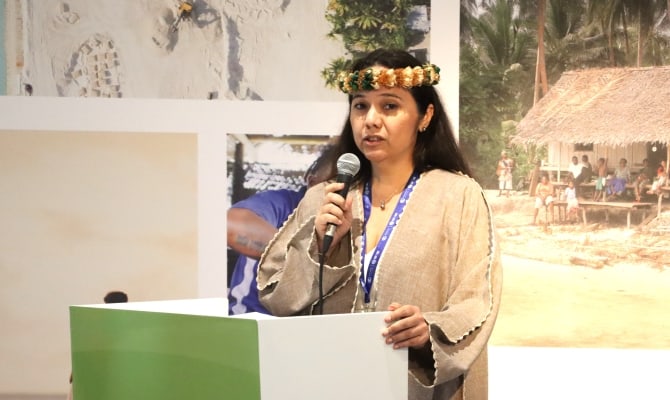The climate envoy of the Republic of the Marshall Islands (RMI) Tina Stege, Saturday expressed grave concerns about attempts by certain countries to weaken the emphasis on Small Island Developing States (SIDS) at the ongoing COP28 climate change negotiations in Dubai.
Tina Stege, representing the Alliance of Small Island States (AOSIS), emphasised the significance of solidarity among nations in addressing the climate crisis.
“This is very much an issue at this COP, and AOSIS is rallied to ensure we all speak with one voice to reiterate and reaffirm the principles of the Paris Agreement. This is an issue of principle that SIDS and Least Developed Countries (LDCs) are recognised as special circumstances due to very unique vulnerabilities because of climate change,” said Stege.
She acknowledged that many countries face vulnerability, and the intensifying crisis demands a collective global response.
“The pain and suffering worldwide are increasing. Lives are being lost, people are suffering, and countries are grappling with their inability to respond effectively.
“We must recognise that this issue is surfacing because we haven’t done enough as a global community,” Stege said.
Stege clarified that the unique vulnerabilities of SIDS, particularly their size and capacity, are enshrined in the Paris Agreement.
“We are not here to rewrite Paris; we are here to strengthen it.
“We will not compromise on these principles and certainly, my view is that weakening the language that recognises the particular vulnerabilities and special circumstances of SIDS would weaken the agreement,” she said in a media interview in Dubai.
Stege also commended the Pacific’s efforts to put the fossil fuel phase-out at the centre of the discussion.
“It’s crazy that it’s not the centre of discussion every year. We’ve worked hard to ensure it’s on the agenda, focusing on the root cause of the problem”.
“The Pacific felt the responsibility to bring fossil fuel phase-out to the forefront. We’ve worked strongly with AOSIS and reached out beyond SIDS through the High Ambition Coalition (HAC) to make this call resonate globally,” Stege explained.
As the chair of HAC, the Marshall Islands has engaged with diverse countries, emphasising the urgency of addressing climate change collectively.
Stege said that political will is crucial in the final week of negotiations.
“On time, we don’t have much time – we are onto the second week. That’s not enough hours in the day to get through the negotiations and discussions that really need to happen. With that said, if you have the political will, you make the time and make it happen,” she said.
The HAC has been supporting for the recognition that the 1.5°C target is an existential threat to all nations.
Stege referred to a statement from the UN General Assembly, where 26 leaders called for fossil fuel phase-out, progress on the global goal of adaptation, efforts to build resilience, and increased accessibility to finance—all to be addressed in the global stocktake.
Stege reiterated the Pacific’s dedication to finding partners worldwide to support the push for fossil fuel phase-out.
“There is no course correction without addressing the root cause of climate change, which is burning fossil fuels. We have to do that to keep the 1.5 alive,” she emphasised.
The fight continues as negotiators work towards meaningful outcomes in the final days of COP28.
